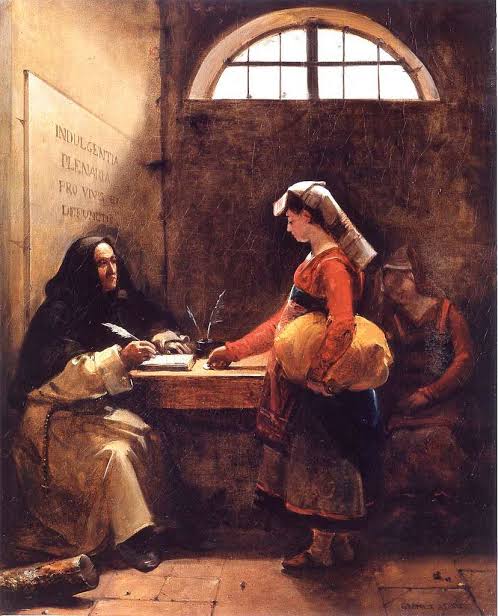Doctrine
Catholic Teaching and Doctrine on Indulgence.
Indulgences have been a part of Catholic teaching and practice for centuries, though they remain a subject of considerable misunderstanding and controversy. This article will explore the history, theology, and modern practice of indulgences in the Catholic Church.
Historical Background
The concept of indulgences emerged gradually in the early Middle Ages, evolving from earlier penitential practices. In the early Church, those who had committed serious sins often faced lengthy periods of public penance before being readmitted to full communion. Over time, these penances could be reduced or commuted through various acts of devotion or charity.
By the 11th century, the idea of indulgences as a remission of temporal punishment due to sin had taken shape. The Church taught that while sacramental confession forgave the guilt of sin, temporal consequences remained that required purification, either in this life or in purgatory. Indulgences offered a way to reduce this temporal punishment.
The practice gained prominence during the Crusades, with popes offering plenary (full) indulgences to those who fought to reclaim the Holy Land. However, abuses soon arose, particularly in the form of indulgences granted in exchange for financial contributions. The most infamous example was the indulgence campaign of Johann Tetzel in the early 16th century, which helped spark Martin Luther’s protest and the Protestant Reformation.
Theological Foundation
The Catholic doctrine of indulgences is rooted in several key theological concepts:
- The Communion of Saints: The Church teaches that all believers, living and dead, are united in a spiritual bond. This allows for a sharing of spiritual goods, including the merits of Christ and the saints.
- The Treasury of Merit: This “treasury” consists of the infinite value of Christ’s sacrificial death, along with the prayers and good works of the Virgin Mary and the saints. The Church can draw upon this treasury for the benefit of its members.
- The Power of the Keys: Based on Matthew 16:19, the Church claims the authority to “bind and loose” in spiritual matters, including the granting of indulgences.
- Temporal Punishment: While the eternal punishment for sin is forgiven through sacramental confession, the Church teaches that temporal consequences remain, requiring purification.
Definition and Types of Indulgences
The Catechism of the Catholic Church defines an indulgence as “a remission before God of the temporal punishment due to sins whose guilt has already been forgiven” (CCC 1471). Indulgences can be partial (remitting part of the temporal punishment) or plenary (remitting all temporal punishment currently due).
To gain an indulgence, one must be in a state of grace, have the intention of receiving the indulgence, and fulfill the prescribed works. For a plenary indulgence, one must also be free from all attachment to sin, even venial sin.
Indulgences can be applied to oneself or to the dead, but cannot be applied to other living persons. The Church teaches that indulgences for the dead are offered as prayers for their benefit, trusting in God’s mercy, rather than as guaranteed remission.
Reforms and Modern Practice
Following the abuses highlighted during the Reformation, the Catholic Church implemented significant reforms to the practice of indulgences. The Council of Trent (1545-1563) prohibited the sale of indulgences and sought to eliminate associated superstitions and misunderstandings.
Further reforms came in the 20th century. Pope Paul VI’s 1967 Apostolic Constitution “Indulgentiarum Doctrina” significantly revised the practice, reducing the number of plenary indulgences and emphasizing their spiritual nature. The 1983 Code of Canon Law and the 1992 Catechism of the Catholic Church further clarified and codified the doctrine.
In modern Catholic practice, indulgences are typically attached to specific prayers, pilgrimages, or acts of charity. For example, praying the Rosary in a church or as a family can carry a partial indulgence, while participating in certain liturgies on specified days (such as Divine Mercy Sunday) can carry a plenary indulgence.
Controversies and Ecumenical Considerations
Despite reforms, indulgences remain a point of controversy in ecumenical dialogue. Many Protestant denominations reject the concept entirely, viewing it as unbiblical and potentially detracting from the sufficiency of Christ’s sacrifice.
Some critics argue that indulgences can lead to a mechanistic view of salvation, focusing on external acts rather than interior conversion. Defenders counter that properly understood, indulgences encourage spiritual growth and solidarity within the Church.
In recent years, there have been efforts to present indulgences in a more ecumenically sensitive manner, emphasizing their connection to repentance, faith, and charity rather than as a kind of spiritual transaction.
Conclusion
The Catholic teaching on indulgences reflects complex theological ideas about sin, forgiveness, and the nature of the Church. While reforms have addressed historical abuses, the doctrine remains a distinctive and sometimes controversial aspect of Catholic spirituality. Understanding indulgences requires grappling with fundamental questions about the relationship between God’s grace, human freedom, and the role of the Church in salvation.
For Catholics, indulgences represent a means of spiritual growth and an expression of the Church’s power to mediate God’s forgiveness. For others, they remain a puzzling or problematic concept. As with many aspects of religious doctrine, the theology of indulgences continues to evolve, shaped by ongoing reflection, dialogue, and the lived experience of believers.
About Author



























